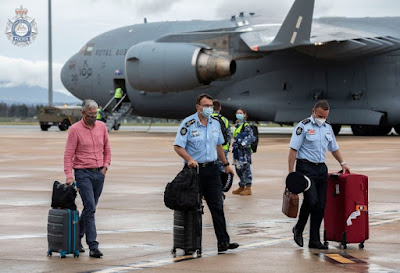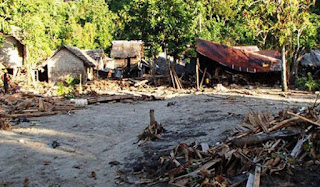RURAL MARKET VENDERS OPT TO SLEEP ON STREETS
BY
GEORGINA KEKEA
“We have our people living in town but we
are embarrassed to go to their house after market hours because we don’t want
to impose on them especially since life in town is very hard”, says Peter Sela
from Gela.
The number of people sleeping in public
places have risen considerably, especially after Honiara City Council (HCC) has
disallowed market venders to lodge at the Honiara central market.
Peter Sela a fisherman from Gela in Central
islands province sells fish at the Honiara Central market and when I
caught up with him, he was spending the night along the walkway of the National
Provident Fund (NPF) plaza.
Sela hails from Sandfly and his village is
called Ravu. Sandfly passage, the channel between big Gela and Sandfly Island
is a destination for divers and snorkelers and boasts some of the best white
sandy beaches in the country with clear crystal water.
However life is not as pristine for him as
one would thought it would be coming from a place as beautiful as Sandfly. People
like Sela have to leave the comfort of their beautiful homes to spend the night
in harsh and humbling conditions like this in search for money. After a day’s
work whilst some of us go back to the comfort of our homes to lay our weary
heads to rest, these villagers don’t.
“Sometimes we lie in our boats at the Yacht
club beach whilst other times like tonight, we come to this place to hide from
the rain and wind”, Sela said.
Mothers, wives, women and girls are also
amongst those seeking shelter under the rooftop of these public buildings.
“We should have left already in the
afternoon but because our produce just got sold out in the evening, it is
already late for us to leave so here we are waiting for daylight to come
quickly so that we can be on our way”, Sela’s cousin, Lydia Durai said.
Whilst the global trend now focuses on
women and girls having a private space, for these women, they surely have
missed out on that and do not seem to mind at all.
“We sometimes go for a day or two without a
proper shower and sometimes we put that off till we are in the comfort of
our own homes”, says both the men and women. Last time central market used to
allow their taps for them to use but not anymore, they say.
They revealed that for dinner they usually
have bread and taiyo and should they have access to hot water, they might have
a cup of coffee or tea to keep them warm during cold nights. However going to
and fro daily just to enjoy the basic necessities one needs only at home is an
exercise deemed very expensive for them.
Though the distance from Honiara to Gela is
not far, (a couple of hours at least) the women usually hire a boat to bring
their produce, costing them $600 a trip. So it is eminent that they sell all
their produce before they make their trip back home. Some of them usually spend
a night or two and on a weekend, when they don’t go back home, they also
attended church programs same as when they would be back in their home
villages, no matter what.
“We attended Palm Sunday church service at
the All Saints church. We just got up from our resting place here and then we
walked over to All Saints to take part in the service”, the women said.
Whilst the reason for them to spend the
night in public places might not be a good one, there is not much they feel
they can do about it. Peter Sela says for one, their wantoks reside far from
the city and more so, they also don’t want to intrude on their privacy.
“We do not want our people to think that we
are here to finish their food or contribute unnecessarily to the increase of
their water and electricity bills because cost of living is very expensive
these days. Not only that but some of our wantoks and the people we know reside
far from town and as you can see, we also have a lot of stuff that we buy so it
is best we stay close to our departure area”, Sela said.
 |
| Gela islands (Photo credit Wikipedia) |
Meanwhile, he says there is so much they
wish their government would do for them.
“If we sell our produce back home, who is
going to buy them? We don’t have much economic activities back home and even
Tulaghi is not an economical hub. We don’t really need the money but our
children does. Back home we don’t need to buy for food. Everything is free but we
need money for our children’s education and our other obligations that is why
we have to make these sacrifices. If we have businesses and good
infrastructural development in our province, then we don’t need to come to
Honiara”, Sela said.
He continued to say that they wish government
would step in to alleviate some of the problems from them.
“Even to buy a small plot of land to build
a dormitory for us to spend the night when we come to town would be better.
That doesn’t mean that it has to be free but at least a dormitory that charges
us a reasonable amount, like $10, or $20 a night. Like now, when we have women
with us, we men don’t get to sleep much but to keep watch over our relatives.
We only have a proper sleep when we arrive back at our home village”, Peter
Sela said.
ENDS///





Comments
Post a Comment